Education
THE OUTCOME OF OUR STRIKE SUSPENSION HAS NOT BEEN FELT TILL DATE–SSANU PRESIDENT LAMENT

ADDRESS BY THE NATIONAL PRESIDENT OF THE SENIOR STAFF ASSOCIATION OF NIGERIAN UNIVERSITIES (SSANU), COMRADE MOHAMMED HARUNA IBRAHIM, fnipr, fnils AT THE 18th ANNUAL RETREAT AND 74TH BUSINESS MEETING OF THE ASSOCIATION OF REGISTRARS OF NIGERIAN UNIVERSITES HELD ON THURSDAY AND FRIDAY, 12TH AND 13TH OCTOBER 2023 AT THE UNIVERSITY OF BENIN
I wish to thank this august body for once again inviting me to address you on salient issues affecting us all as senior non- teaching staff in the University system and more specifically as University administrators. I am more pleased because this invitation further cements the relationship between the Association of Registrars of Nigerian Universities (ARNU) and the Senior Staff Association of Nigerian Universities (SSANU). I will not stop reiterating the critical and strategic roles of the Registrar in the affairs of SSANU, thus, it pleases me being here today, to deepen and consolidate this engagement.
Because of your loaded activities at this meeting, and the fact that I had dwelt on some of the issues in our previous engagements, I shall not bore you with preambles but go directly into the subject matter. Suffice it to recall however, that my last address to this body was in June last year, in the thick of the national strike. We had since suspended the strike following a memorandum of agreement signed with representatives of the Federal Government. Sadly, however, the outcome of the strike suspension has not been felt till date, because it appears Government only undertook the memorandum of agreement as a measure to quell the strike, and not in good faith to implement its outcomes, as subsequent events have shown.
Between June last year and now, the Union has had to take up a number of issues which I will quickly outline.
Usurpation of the powers of Councils by the office of the Head of Service and other external agencies of Government
Perhaps the biggest challenge besetting the University system in the last few years, has been the incursion into the affairs of Universities and erosion of the powers of Councils by external bodies, particularly the office of the Head of Service of the Federation. The University system is not the civil service, yet we have a situation now, unknown to the law, where employments, appointments and promotions, conditions of service and the career structures of Universities are being determined by the office of the Head of Service. Only last week, a circular was released to Bursars of Universities directing them that annual increments for promotions begin in January and not October as has been the established practice in line with the beginning of the academic session.
This development, we find very unfortunate, because the cultures, traditions and ethos of the University system are being destroyed by organs of government unknown to the laws. To employ even a cleaner or gardener, a Vice- Chancellor or Registrar would go and queue up in the office of the Head of Service for approval. As a result, running our Universities have become more cumbersome, inefficient, expensive, and bereft of exercise of its powers as dictated to by these external bodies.
The union has cried out against this anomaly in its various communiques after our National Executive Council meetings. We have similarly written a letter to the President of the Federal Republic of Nigeria on the subject, while drawing the attention of the Ministers of Education and Labor to the issue. I am happy that the theme of this conference is weaved around University autonomy, so I shall be expecting that the deliberations shall bring about solutions which the union can also take up from its own end. We are willing to take up new approaches as proposed by ARNU to stem the tide of this menace.
The challenge with IPPIS
Strongly tied to the issue of external bodies determining the workings of the University, is the introduction of IPPIS into the University system. While it is true that SSANU and NASU embraced the payment platform at inception, it was with the clear understanding that it would accommodate all the peculiarities of the University system especially its autonomy. Unfortunately, this was not the case, as we had an IPPIS that greatly distorted the salary payments in the University system.
As a reaction to the IPPIS, we (the JAC of NASU and SSANU), challenged ourselves to create an alternative payment platform, the University Peculiar Personnel Payroll System (U3PS) which is a multitenant system to correct all the observed anomalies. Huge investments were made to create the U3PS which is a product of our members and the major focus is the protection of the offices of the Registrar and Bursar which are being eroded by IPPIS.
We had opportunities to present our U3PS to the relevant government agencies especially the National Information Technology Development Agency (NITDA) alongside the application proposed by ASUU named UTAS, and the existing IPPIS. Each detail of the three payment platforms were scrutinized via various tests determined by NITDA itself. Till date, over a year after, the official results are yet to be released although unofficial public statements by top Government functionaries have revealed that our U3PS was rated best. The middle of the road approach which was encouraged by the immediate past Minister of Education was the adoption of the best features of each of the three payment platforms into a hybrid for the purpose of serving the peculiar nature of the University system.
This position was how far we could come before deliberations ceased on account of the transition and appointment of a new Minister of Education.
Matters Arising from the last National Industrial Action and present status
The last national industrial action can strongly be tied to the failure in implementing the 2009 agreement reached with the union. However, the specific issues in contention are:
Non- payment of Earned Allowances.
Non- payment of Arrears of Consequential Adjustment of National Minimum Wage.
Poor funding of State Universities.
Delay in renegotiation of the 2009 Agreements.
Usurpation of Headship of Non-teaching Units in clear violation of conditions of Service and Establishment procedures.
Following series of engagements with government officials, especially the then Minister of Education and the former Executive Secretary of the National Universities Commission, the leadership of the Joint Action Committee of SSANU and NASU thought it wise to suspend the industrial action. This decision did not come without brickbats and attacks from our members who felt the strike must continue until actions have been concluded over the specific issues. Nevertheless, I am sure that subsequent developments after our strike suspension and till date, have revealed the wisdom and tact in the decision of the leadership. If the strike had not been suspended when it was, I wonder on which legs the union would be standing, to continue to pursue the interests of its members. Thus, as leaders, we are often left with no option but to take seemingly unpopular choices on behalf of our members provided we are guided by our consciences and clear thoughts on the way forward. Today, we can confidently say that there is no regret for suspending the strike, even though we are still pursuing the release of the four months salaries withheld our members during the period of the strike. I am sure members of ARNU would have read the SSANU position on the issue of our withheld four months’ salaries in various newspaper and our interviews on television.
Renegotiation of the 2009 Agreement
The renegotiation of the 2009 agreement, which had been agreed to be comprehensively reviewed every three years, was a major contention leading to the industrial action.
Agitations for the review started by 2011 but Government only deemed it fit to act in 2017 by setting up the Babalakin Committee. Immediately the Babalakin Committee was inaugurated, we had a team of Registrars and Bursars who drew up the proposals that make up the plank of our demands with Government.
Till date, the Committee is yet to conclude its assignments even after three Chairmen. Professor Munzali Jibril, who took over from Babalakin never invited us for a single meeting, while three meetings were held with Professor Nimi Briggs, now of blessed memory. At the risk of sounding immodest, this union had acquitted itself honorably in all its engagements with the Briggs Committee as can be attested to by the immediate past Chairman of ARNU.
Highlights of our demands as I spelt out at my last engagement with this forum are:
Registrars and Bursars should be placed on a special salary which is 100% higher than the salary of the highest paid regular staff of the University (Teaching and Non-Teaching) after the negotiations.
Introduction of a new salary table with a 700% increase on the existing table based on current economic and existential realities.
Enhanced percentages and amounts on existing allowances in the 2009 agreement.
Introduction of new allowances not in the 2009 agreement
I need to clarify here, that in our last discussion with the Government team, an offer of 35% increase for staff on CONTISS 15 and 23.5% for others was made to the union. Naturally and expectedly, this proposal was rejected because it falls far below the 700% proposal we had made to Government. Only recently, we received information that government had approved a 35% increase for Professors and equivalent in the non- teaching cadres and 25% for others. This for us, is an award, since the outcome is not a product of any Collective Bargaining Agreement. However, we shall not reject an award and as such, we welcome the payment, while expecting Government to conclude our negotiations so that a concrete and negotiated salary can be reached.
As important as the monetary aspects of the renegotiation are, equally important are the non- monetary aspects, which are listed as follows:
Review of representation on Council, especially via Congregation, to include more non- teaching staff.
Review of process of selecting and appointment of Vice-Chancellors to have the participation of Non- teaching staff on the Selection Board.
Encroachment on Non-Teaching Staff Positions by Academic Staff
Directorate system
Establishing a benchmark for uniform career positions in Nigerian Universities instead of leaving them entirely in the hands of individual University Governing Councils
Review of membership of Appointments and Promotions Committee (A&PC) for Senior Non-Teaching (Administrative & Professional) Staff
Setting a proper template for Staff ratios and Establishment
Review of benchmarks for Staff training and development
While we await the reconstitution of the Government Team and convening of meetings, we would like to invite ARNU to assist in providing additional information, especially legal documents, on these demands.
Key among the non- monetary issues that require strong input from ARNU is the uniform career structure for all cadres of staff. It is our contention that there should be uniformity in the progression of staff across all Nigerian Universities. A template in this regard has already been designed by SSANU but may also require expert touch from our Registrars possibly through a joint committee to reconsider at the proposals.
National Minimum Wage
The 2009 agreement was unambiguous in stating that where there is an increase in the salaries and allowances of public servants, there must be a corresponding increase in the salaries of SSANU members.
While we are happy to observe that a preponderance of our members have been paid, we are fully on course towards ensuring that our principal officers- Registrars and Bursars, are paid this reviewed wage as a matter of right. The non- payment of arrears to Registrars and Bursars stem from a wrong understanding of the salary status of Registrars and Bursars, and the nomenclature of Consolidated salary attached to them. The union is taking this matter up but will plead for the patience of our Registrars and Bursars. To get the payment made to our ordinary members took over two years but I can assure you that end is in sight on this issue.
State Universities
The last few years have witnessed a trend where State Universities have been battered and bruised due to neglect and poor funding by Governors who under the law, are Visitors to those Universities. Governing Councils and Managements of those Universities blindly support these negative actions of those Governors because of the fear of losing their appointments, unwittingly stunting the developments of those Universities.
From amputation of salaries in some State Universities, mass sack and retrenchment in others and even proscription of trade unions, the trend has been indeed disturbing. Our colleagues in State Universities are going through harsh periods of non- payment of salaries going into upwards of months due to non-release of subventions by proprietor Governments.
The conditions of service in State Universities are nothing to write home about and to compound matters further, State Governments that cannot adequately cater for the existing University decide out of cheap populism and political considerations, to establish more Universities. Our contention therefore, is that the NUC must play a stronger supervisory role in the accreditation of Universities by denying Institutional Accreditation to Universities that are lagging behind in payments of salaries.
Delayed engagements with the present governments
We wish to point out that immediately this new government came on board, we had reached out to the relevant functionaries, especially the Ministers of Education and Labour. Our moves so far, have been quite unproductive as it appears that both Ministers have not yet gotten a grip of governance. Our letters of congratulations and requests for courtesy calls have been un-replied. This development does not bode good for the system and is only a pointer to the stormy days ahead. We hope however, that our fears would be debunked and that in the shortest possible time, the Ministers shall turn a positive leaf in the interests of industrial peace in the University system.
Conclusion
I wish to once again register appreciation to ARNU for realizing the need to synergize with the union. While ARNU may be a highly influential body, it is not a trade union and to that extent, would need the collaboration of a trade union to register some of its agitations. You can be assured that SSANU is pleased to play this role. However, the status of the agitations of the Union can only be enhanced through information and guidance. We would therefore urge ARNU as a group and Registrars in their personal capacities on individual University basis, to assist the union in this regard.
We also urge our Registrars to extend such cooperation to their Branch leaderships so as to enhance the delivery even at local levels. This cooperation will strengthen the status and position of the Union during engagements at the Federal and State levels.
Thank you for listening.
Education
1ST NIGERIAN TERTIARY INSTITUTIONS CONFERENCE ON UN SUSTAINABLE DEVELOPMENT GOALS (SDGS) ESSAY COMPETITION
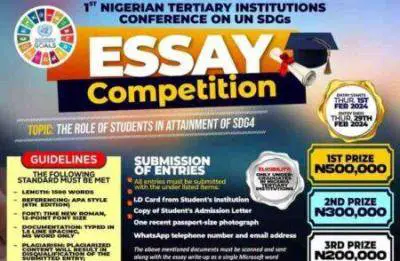
Competition Overview:
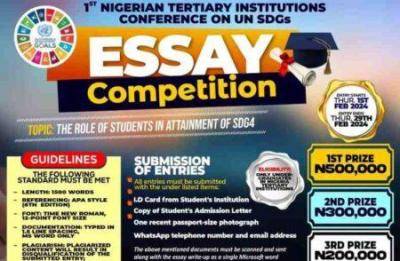
The SDG Youth Essay Competition offers a grand prize of N1 million for the top three winners, along with free sponsorship to attend the 1st Nigeria Tertiary Institution Conference on Sustainable Development Goals (SDGs) in April 2024 in Abuja.
Competition Requirements:
1. Eligibility:
– Open exclusively to undergraduates in Nigerian tertiary institutions.
2. Entry Guidelines:
– Topic:The Role of Students in Attainment of SDG4
– length: Essays should be 1500 words.
– Entry Period: Thursday, February 1, 2024 – Thursday, February 29, 2024
– Referencing: APA Style (6th Edition).
– Font: Times New Roman, 12-point font size.
– Documentation: Typed in 1.5 line spacing, MS Word format only.
– Plagiarism: Only original content is accepted; plagiarized entries will be disqualified.
Benefits:
– Prizes:
– 1st Prize: N500,000
– 2nd Prize: N300,000
– 3rd Prize: N200,000
– Winners will also receive free sponsorship to attend the 1st Nigeria Tertiary Institution Conference on Sustainable Development Goals (SDGs) in April 2024 in Abuja.
Required Documents:
– Student’s Institution ID Card
– Copy of Student’s Admission Letter
– One recent passport-size photograph
– WhatsApp telephone number and email address
Application Procedure:
– All entries and submissions (essay and required documents) should be scanned and sent to nigeriaessay@sdgyouth.org before the deadline.
For Further Inquiries:
– Call: 08068931151, 08133846739, 07067772964
– Email: nigeriaessay@sdgyouth.org
Deadline: February 29th, 2024
Don’t miss this opportunity to contribute to achieving SDG4 and win exciting prizes. Submit your entry and required documents before the deadline. For any inquiries, feel free to contact them via phone or email.
Education
PENTAGON PARTNERS NATIONAL ESSAY COMPETITION FOR UNDERGRADUATE LAW STUDENTS
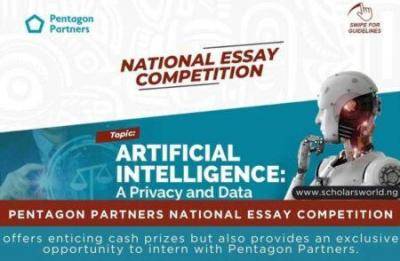
Competition Overview:
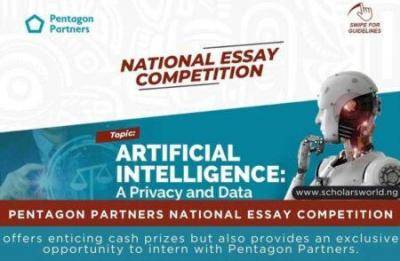
The National Essay Competition invites undergraduate law students to showcase their expertise and contribute to the discourse on AI, privacy, and data protection. In addition to cash prizes, participants have the chance to intern with Pentagon Partners, gaining valuable hands-on experience.
Competition Requirements:
1. Eligibility:
– The competition is open to 400-level and 500-level undergraduate law students in Nigerian universities.
2. Essay Requirements:
– Length: Essays should not exceed 1500 words.
– Format: Double spaced, 12pt Times New Roman font.
– References: OSCOLA format for citations with 10pt font size for footnotes and endnotes.
– Submission Format: Essays must be submitted in PDF format.
– Entrant Details: Include full names, school, level, phone number, and email address in both the body of the email and on the last page of the essay.
– Single Entry: Each entrant is allowed only one submission.
– Originality: Plagiarism will result in automatic disqualification.
Competition Benefits and Timeline:
1. Prizes:
– Winner: N200,000
– 1st Runner Up: N150,000
– 2nd Runner Up: N100,000
2. Internship Opportunity:
– In addition to cash prizes, winners have the exclusive opportunity to intern with Pentagon Partners, enhancing their career prospects.
Application Procedure:
– Interested participants should submit their essays to essay@pentagonpartnerslp.com during the submission period.
– The subject of the email should be the Essay topic
For additional information and updates, visit www.pentagonpartnerslp.com.
Deadline: March 22nd, 2024
Don’t miss this chance to showcase your legal expertise, contribute to important discussions on AI and law, and vie for enticing cash prizes. Pentagon Partners looks forward to receiving your submissions.
Education
SYSTEMSPECS CHILDREN’S DAY ESSAY COMPETITION (CDEC), 2024

Purpose:
Inaugurated in 2020, the CDEC is part of SystemSpecs’ Corporate Social Responsibility (CSR) commitment to promoting capacity development in the Nigerian ICT industry. By encouraging young Nigerians to tackle everyday issues, the competition contributes to intellectual growth and societal progress.

Topic:
The theme for the 2024 competition is “Protecting the Nigerian Child from the Dangers of Online Technology.” Participants are tasked with exploring strategies to safeguard children in an increasingly digital world.
Eligibility:
– Open to primary and secondary school students in Nigeria aged 9 to 16.
– Junior category (ages 9 to 12) essays must not exceed 1,000 words.
– Senior category (ages 13 to 16) essays must not exceed 1,500 words.
Prizes:
– Winners will receive generous rewards, including a high-capacity laptop, premium headphones, a portable laptop stand, a smart wristwatch, and one year of internet data, among other items.
– Consolation prizes will be awarded to other participants.
Application Process:
– Interested candidates should access the application page
– Essays must be written in English and reflect original thought.
– Each participant is limited to one entry.
– Entries must be endorsed by an accredited school official, parent, or legal guardian.
– Deadline for submissions is April 12, 2024.
Submission Guidelines:
– All submissions must be in PDF format and include the student’s name, home and school addresses, email address, and contact phone number.
– Double entries will result in automatic disqualification.
– Submissions must be received by March 15, 2024, at 5:00 p.m.
Notification of Winners:
– Successful students and schools will be contacted in the second quarter of the year.
– Updates on winners will be announced on @nercng social media platforms.
The SystemSpecs Children’s Day Essay Competition offers a unique opportunity for Nigerian students to demonstrate their creativity and problem-solving skills. By addressing the theme of online child protection, participants contribute to building a safer and more secure digital environment for all. We encourage eligible students to seize this opportunity and showcase their talent and ingenuity.
-

 News2 years ago
News2 years agoFull Text of President Bola Tinubu’s Inauguration Speech on May 29, 2023
-

 Education6 months ago
Education6 months agoSYSTEMSPECS CHILDREN’S DAY ESSAY COMPETITION (CDEC), 2024
-

 CELEBRITY NEWS2 years ago
CELEBRITY NEWS2 years ago“E no balance”-Netizens react as Bobrisky shows off new shape days after surgery
-

 entertainment9 months ago
entertainment9 months agoAuthorities Arrest Six in Connection with Murder of South African Rapper AKA [VIDEO]
-
Headlines2 years ago
FULL TEXT: Tinubu Addresses 78th UN General Assembly
-
Headlines2 years ago
Full Text Of President Bola Tinubu’s Address To Nigerians On Socio-economic Challenges
-
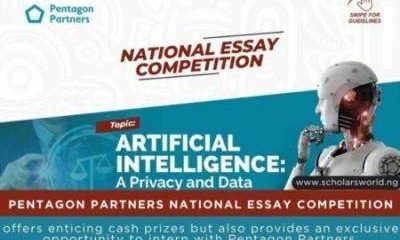
 Education6 months ago
Education6 months agoPENTAGON PARTNERS NATIONAL ESSAY COMPETITION FOR UNDERGRADUATE LAW STUDENTS
-

 Headlines9 months ago
Headlines9 months agoTinubu Takes Full Responsibility for Current Economic Hardship

